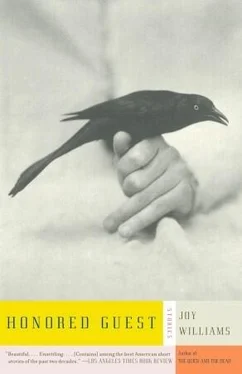“And I asked him if there was any one he wouldn’t tattoo, and he said drunks and the dying. So that was that.”
“But you didn’t have to tell him. You won’t have to tell him,” Helen said.
“That’s true,” Lenore said dispiritedly. Then she looked angrily at Helen. “Are you crazy? Sometimes I think you’re crazy!”
“Mom!” Helen said, crying. “I want you to do what you want.”
“This was my idea, mine!” Lenore said. The dog gave a high nervous bark. “Oh dear,” Lenore said, “I’m speaking too loudly.” She smiled at him as if to say how clever both of them were to realize this.
That night Lenore could not sleep. There were no dreams, nothing. High clouds swept slowly past the window. She got up and went into the living room, to the desk there. She looked with distaste at all the objects in this room. There wasn’t one thing here she’d want to take with her to the grave, not one. The dog had shuffled out of the bedroom with her and now lay at her feet, a slipper in his mouth, a red one with a little bow. She wanted to make note of a few things, clarify some things. She took out a piece of paper. The furnace turned on and she heard something moving behind the walls. “Enjoy it while you can,” she said. She sat at the desk, her back very straight, waiting for something. After a while she looked at the dog. “Give me that,” she said. “Give me that slipper.” He growled but did not leave her side. She took a pen and wrote on the paper, When I go, the dog goes. Promise me this . She left it out for Helen.
Then she thought, That dog is the dumbest one I’ve ever had. I don’t want him with me. She was amazed she could still think like this. She tore up the piece of paper. “Lenore!” she cried, and wrung her hands. She wanted herself. Her mind ran stumbling, panting, through dark twisted woods.
When Helen got up she would ask her to make some toast. Toast would taste good. Helen would press the Good Morning letters on the bread. It was a gadget, like a cookie cutter. When the bread was toasted, the words were pressed down into it and you dribbled honey into them.
In the morning Helen did this carefully, as she always had. They sat together at the kitchen table and ate the toast. Sleet struck the windows. Helen looked at her toast dreamily, the golden letters against the almost black. They both liked their toast almost black.
Lenore felt peaceful. She even felt a little better. But it was a cruelty to feel a little better, a cruelty to Helen.
“Turn on the radio,” Lenore said, “and find out if they’re going to cancel school.” If Helen stayed home today she would talk to her. Important things would be said. Things that would still matter years and years from now.
Callers on a talk show were speaking about wolves. “There should be wolf control,” someone said, “not wolf worship.”
“Oh, I hate these people,” Helen said.
“Are you a wolf worshipper?” her mother asked. “Watch out.”
“I believe they have the right to live too,” Helen said fervently. Then she was sorry. Everything she said was wrong. She moved the dial on the radio. School would not be canceled. They never canceled it.
“There’s a stain on that blouse,” her mother said. “Why do your clothes always look so dingy? You should buy some new clothes.”
“I don’t want any new clothes,” Helen said.
“You can’t wear mine, that’s not the way to think. I’ve got to get rid of them. Maybe that’s what I’ll do today. I’ll go through them with Jean. It’s Jean who comes today, isn’t it?”
“I don’t want your clothes!”
“Why not? Not even the sweaters?”
Helen’s mouth trembled.
“Oh, what are we going to do!” Lenore said. She clawed at her cheeks. The dog barked.
“Mom, Mom,” Helen said.
“We’ve got to talk, I want to talk,” Lenore said. What would happen to Helen, her little girl …
Helen saw the stain her mother had noticed on the blouse. Where had it come from? It had just appeared. She would change if she had time.
“When I die, I’m going to forget you,” Lenore began. This was so obvious, this wasn’t what she meant. “The dead just forget you. The most important things, all the loving things, everything we …” She closed her eyes, then opened them with effort. “I want to put on some lipstick today,” she said. “If I don’t, tell me when you come home.”
Helen left just in time to catch the bus. Some of her classmates stood by the curb, hooded, hunched. It was bitter out.
In the house, Lenore looked at the dog. There were only so many dogs in a person’s life and this was the last one in hers. She’d like to kick him. But he had changed when she’d gotten sick, he hadn’t been like this before. He was bewildered. He didn’t like it — death — either. She felt sorry for him. She went back into her bedroom and he followed her with the slipper.
At nine, the first in a number of nurse’s aides and companions arrived. By three it was growing dark again. Helen returned before four.
“The dog needs a walk,” her mother said.
“It’s so icy out, Mom, he’ll cut the pads of his feet.”
“He needs to go out!” her mother screamed. She wore a little lipstick and sat in a chair wringing her hands.
Helen found the leash and coaxed the dog to the door. He looked out uneasily into the wet cold blackness. They moved out into it a few yards to a bush he had killed long before and he dribbled a few drops of urine onto it. They walked a little farther, across the dully shining yard toward the street. It was still, windless. The air made a hissing sound. “Come on,” Helen said, “don’t you want to do something?” The dog walked stoically along. Helen’s eyes began to water with the cold. Her mother had said, “I want Verdi played at the service, Scriabin, no hymns.” Helen had sent away for some recordings. How else could it be accomplished, the Verdi, the Scriabin … Once she had called her father and said, “What should we do for Mom?”
“Where have you been!” her mother said when they got back. “My God, I thought you’d been hit by a truck.”
They ate supper, macaroni and cheese, something one of the women had prepared. Lenore ate without speaking and then looked at the empty plate.
“Do you want some more, Mom?” Helen asked.
“One of those girls that comes, she says she’ll take the dog,” Lenore said.
Helen swallowed. “I think it would be good,” she said.
“That’s it then. She’ll take him tomorrow.”
“Is she just going to see how it works out or what?”
“No, she wants him. She lives in an iffy neighborhood and the dog, you know, can be impressive when he wants. I think better now than later. He’s only five, five next month.” She knew the dog’s birthday. She laughed at this.
The next day, when Helen came home from school the dog was gone. His bowls were gone from the corner near the sink.
“At least I have my slipper back,” Lenore said. She had it in her hand, the red slipper.
Helen was doing her homework. She was a funny kid, Lenore thought, there she was doing her homework.
“It’s almost over for me,” Lenore said. “I’m at the end of my life.”
Helen looked up. “Mom,” she said.
“I can’t believe it.”
“I’m a nihilist,” Helen said. “That’s what I’m going to be.”
“You can’t think you’re going to be a nihilist,” her mother said. “Are you laughing at me? Don’t you dare laugh at me. I’m still your mother.” She shook her fist.
“Mom, Mom,” Helen said, “I’m not laughing.” She began to cry.
“Don’t cry,” Lenore said dully.
Helen looked down at her textbook. She had underlined everything on one page. Everything! Stupid … She’d be stupid in Florida too, she thought. She could think about Florida only by being here with her mother. Otherwise Florida didn’t really exist.
Читать дальше












